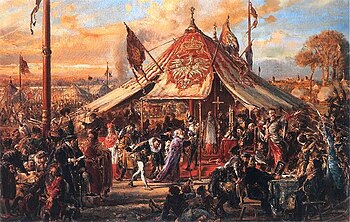Golden Liberty

Golden Liberty (
Development
This political system, unique in Europe, stemmed from the consolidation of power by the
The political doctrine of the Commonwealth of the Two Nations was "our state is a republic under the presidency of the King".
The monarch's power was limited, in favour of the sizable noble class. Each new king had to subscribe to King Henry's Articles, which were the basis of Poland's political system and included almost unprecedented guarantees of
The foundation of the Commonwealth's political system, the "Golden Liberty" (Polish: Złota Wolność, a term used from 1573), included the following:
- the election of the king by all nobles wishing to participate, known as wolna elekcja (free election)
- Sejm, the Commonwealth parliament, which the king was required to hold every two years
- King Henry's Articles
- insurrection), the right of szlachta to form a legal rebellion against a king who violated their guaranteed freedoms
- religious freedom guaranteed by Warsaw Confederation Act 1573[3]
- liberum veto (Latin), the right of an individual land envoy to oppose a decision by the majority in a Sejm session; the voicing of such a "free veto" nullified all the legislation that had been passed at that session; during the crisis of the second half of the 17th century, Polish nobles could also use the liberum veto in provincial sejmiks
- confederatio), the right to form an organization to force through a common political aim
The Commonwealth's political system is difficult to fit into a simple category, but it can be tentatively described as a mixture of these:
- autonomyof its regions. It is, however, difficult to decisively call the Commonwealth either confederation or federation, as it had some qualities of both of them
- oligarchy,[4] as only the male szlachta, around 15% of the population, had political rights
- democracy, as all of the szlachta were equal in rights and privileges, and the Sejm could veto the king on important matters, including legislation (the adoption of new laws), foreign affairs, declaration of war and taxation (changes of existing taxes or the levying of new ones). Also, the 10% of Commonwealth population who enjoyed those political rights (the szlachta) were a substantially larger percentage than in any other European country, and the nobles extended from powerful princes to knights poorer than many peasants; in comparison, in France, only about 1% of the population had the right to vote in 1831, and in 1832, in the United Kingdom, only about 14% of male adults could vote
- elective monarchy, as the monarch, elected by the szlachta, was the head of state
- pacta conventaand other laws, and the szlachta could disobey any of the king's decrees that they deemed to be illegal
Assessment
The "Golden Liberty" was a unique and controversial feature of Poland's political system. It was an exception, characterized by a strong aristocracy and a feeble king, in an age when
Perhaps the closest parallels to Poland's 'Noble Democracy' can be found outside Europe altogether, in America, among the
Others however criticize the Golden Liberty, pointing out it was limited only to the nobility, excluding peasants or townsfolk
In its extreme, the Golden Liberty has been criticized as being responsible for "civil wars and invasions, national weakness, irresolution, and poverty of spirit".
Similar systems
The Golden Liberty created a state that was unusual for its time, but somewhat similar political systems existed in other contemporary states, like the Republic of Venice.[25] (Both states were styled the "Most Serene Republic".[26])
A similar fate was averted by Italy; first due to a secular inability of the kings of France and Spain, and the Papacy, to come to terms on how to divide the country, then through the reaction against
Notably, neither the Republic of Venice nor Italy had a liberum veto among their institutions.
Proverb
The szlachta's rights and privileges became proverbial:
Szlachcic na zagrodzie
równy wojewodzie
—literally,
"The noble on his estate
is equal to the voivode"
or, preserving the Polish original's rhyme scheme:
"The noble behind his garden wall
is the province governor's equal."
To this day, in Poland, this means that a free man (a better sense, today, for szlachcic) regards no man as his superior.
See also
- Executionist movement
- History of democracy
- "Poland is heaven for the nobility, purgatory for townspeople, hell for peasants, paradise for Jews"
References
- ISBN 331911803X
- S2CID 141659882.
- ISBN 0-19-925340-4
- ^
- ^ ISBN 0-19-925339-0, p.262
- ^ Frost, Robert I. The Northern Wars: War, State and Society in northeastern Europe, 1558–1721. Harlow, England; New York: Longman's. 2000. Especially pp9–11, 114, 181, 323.
- ^
- ISBN 1-85866-016-5, Press Google Print, p. 46
- ISBN 0-19-925339-0, p.282
- ^
- Economic History Review30:1 (March), pp18–32
- ^
- ISBN 0-19-512179-1. Googleブック
- ISBN 0-19-925339-0, p.279]
- ^ Joanna Olkiewicz, Najaśniejsza Republika Wenecka (Most Serene Republic of Venice), Książka i Wiedza, 1972, Warszawa
